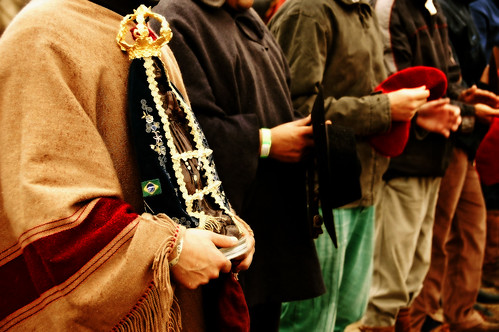 Gender: Feminine
Gender: FeminineUsage: Brazilian
Meaning: “appeared”
(ah-PAH-reh-SEE-dah)
Aparecida is taken from the Brazilian Portuguese title of the Virgin Mary Nossa Senhora Aparecida meaning “Our Lady Who Appeared.” It is ultimately derived from the Latin verb apparere “to appear, come in sight, make an appearance” (itself from the elements ad- “to” + parere “to come forth, be visible”).
Aparecida is, first and foremost, the name of a statue, which gave its name to the church containing it and eventually to the village that grew up around the church.
According to popular belief, the statue appeared to a group of Brazilian fishermen some 300 years ago and brought them a miraculous catch of fish: After working in the River Paraíba for many hours without success, three companions retrieved from its waters a small, dark sculpture, less than three feet in length, which they identified as an image of Our Lady of the Immaculate Conception, and, putting their faith in “the Virgin aparecida (who appeared),” continued to fish — this time with radically better results. Their now full nets they attributed to the mysterious little statue, and miracles and cures have been credited to her ever since.
The river water, having washed away her original colouring, made Our Lady Aparecida a Black Madonna. Writes Marina Warner, in Alone of All Her Sex: The Myth and the Cult of the Virgin Mary,
“In Catholic countries, where blackness is the climate of the devils, not the angels, and is associated almost exclusively with magic and the occult, Black Madonnas are considered especially wonder-working, as the possessors of hermetic knowledge and power…”Aparecida attracts millions of worshippers every year; in fact, her shrine is supposedly the most popular pilgrimage site in Latin America.
 |
| Brazilian actress Aparecida Petrowky (1982-) |
Like Mexico’s Virgin of Guadalupe, the sacred image of Nossa Senhora da Conceição Aparecida (“Our Lady of the Conception Who Appeared”) is said to live “in the heart of every Brazilian.” In 1930, Pope Pius XII declared her Brazil’s principal patroness, legitimising her role as protector and sustainer of the world’s largest Roman Catholic country. Her feast day (12th October) is a national holiday.
The name has entered Brazilian slang as an interjection or exclamation of surprise.
Other forms used in Brazil include:
- Aparecido (masculine)
- Cida (short form)
- Maria Aparecida (a common compound)
No comments:
Post a Comment